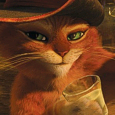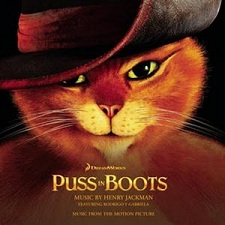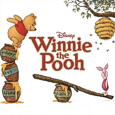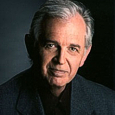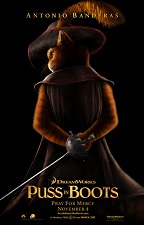 Long before he even met Shrek, the notorious fighter, lover and outlaw Puss in Boots had become a hero when he had set off on an adventure with the tough and street smart Kitty Softpaws and the mastermind Humpty Dumpty to save his town. Now Puss-in-Boots is the true story of The Cat, The Myth, The Legend…The Boots.
Long before he even met Shrek, the notorious fighter, lover and outlaw Puss in Boots had become a hero when he had set off on an adventure with the tough and street smart Kitty Softpaws and the mastermind Humpty Dumpty to save his town. Now Puss-in-Boots is the true story of The Cat, The Myth, The Legend…The Boots.
In this new Dreamworks Animation movie, a notorious fighter and lover, a rebel with a thirst for adventure who always lands on his feet as a cat should, Puss goes in search of treasure in a castle in the sky, aided by Humpty Dumpty and Kitty Softpaws. His mortal enemies are Jack and Jill, two outlaws who discover an ancient power which threatens the world.
To provide music to suit the character of the swaggering Puss and the voices of arch-Latino Antonio Banderas and Salma Hayek, composer Henry Jackman used the folk instruments of traditional Latin music. His movie score also pays homage to the Spanish composer Manuel de Falla, who is best-known for his nocturne for piano and orchestra Nights in the Gardens of Spain and the ballet music for The Three-Cornered Hat.
Jackman blended guitars and Latin percussion with an orchestral sound that shows the Impressionist influences of Claude Debussy and Maurice Ravel, another brilliant example of Henry’s ability to approach such a wide range of film genres with a fresh point of view…
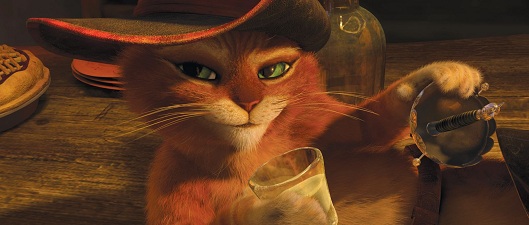
Animated Views: Listening to your score for Puss in Boots, it sounds like you had great fun doing it.
Henry Jackman: That’s definitely true. Working on Puss in Boots was one of the least stressful and most enjoyable experiences I’ve had. I think I can pretty much say I enjoyed it from the beginning to the end, which you can’t usually say of a movie. There’s always some difficult parts that you’re looking forward to getting passed. I’ve been very lucky with Puss in Boots, because of the very nature of the film and the characters, and the kind of the music that was expected. The whole thing was like a roller-coaster ride. I mean, it’s not all-fun music. There are some elements of betrayal and emotion in the film, but I just basically didn’t stop enjoying it from when I started till when I finished.
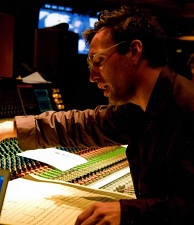 AV: It was your first collaboration with director Chris Miller. How did it go?
AV: It was your first collaboration with director Chris Miller. How did it go?
HJ: I met Chris almost a year before I started writing because the great thing about animation, unlike a live-action movie, is there’s much more than a script to look at. There’s storyboards and early animated sequences, so you can start to get a mental and even sort of an oral picture of the thing is gonna be like. And there’s voice acting already in these sequences so you can feel the spirit and the character of the film.
Chris has been a good director. He had the forsight to call me in about a year before he needed me to start writing just to sort of introduce me to the world of Puss in Boots. Because even if I didn’t see the whole film, there were certain key scenes that are so informative about the characters, about the environment and about the style of music.
He was trying to get me thinking early about a Puss in Boots theme, a Kitty theme, a brotherhood theme, etc. We had a great time and we met a few times before the hard work of the writing all the individual cues. We’d just hang out over Dreamworks and look at sequences and just have more general conversations about the overall tone and direction of the film. He’s good to work with because he has very strong ideas and he expresses them, you know, like a director. It’s not his job to be musically trained and describe to me the orchestration he’s looking for or play me a specific piece of music.
We had a good relationship and trust where he would express himself as any good director should in terms of what he would like in the film tone-wise and then trusts me to interpret that and to find my own music without, on one hand, not being too vague, and on the other hand, not being too invasive. I had a really good space to both collaborate with him but also find my own musical composition that would fit the film.
AV: What were those expectations on Puss in Boots?
HJ: A character like Puss in Boots: everyone knows this character from Shrek. He’s so full of bravado and is a vain-glorious character. He’s macho and funny. He has all these almost exagerated characteristics, and in a way, he gives you musical permission to write a similar theme. When I say expectation, it’s clearly an expectation of the Spanish, Mexican, Iberian – whatever you want to call it – musical influence. You’re gonna hear guitars, you’re gonna hear castagnettes, you’re gonna hear accordions and a lot of Latin percussion.
All of that is a permission that is, in a way, given to you by the character. And, of course, Antonio Banderas is a brilliant voice actor. He gives Puss such incredible character. It’s setting up like a platform to give you the permission to supplement those characteristics with a forthright Spanish influenced theme which, in other movies, would sound ridiculous, but is perfect for Puss because he has all those characterstics. We’re talking about a cat who stares himself in the mirror admiring himself going: “I look good!!”.
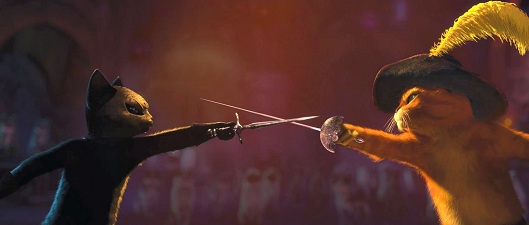
AV: There’s another dimension in the film, totally different from the Spanish setting, that is “fairytale”.
HJ:Yes, we leave the whole Mexican, Latin thing behind and it becomes more like a fairytale, once the characters go up into the sort of kingdom in the cloud. The musical tradition calls much more upon the sort of Harry Potter and fantasy thing. It’s a whole different symphonic language, and I was just really lucky that the film had both these elements: the fantasy element and the Latin element back in the town. The characters and the nature of the story created a really wide and enjoyable palette of musical textures and orchestrations that you could legitimally pursuit and it’s not self indulgent.
AV: Can you tell me about the Ravel and Debussy influence on your music?
HJ: Of course, I wouldn’t be comparing myself to those composers. But I’m lucky because we got all these folk instruments, the guitars and everything, and at the same time we needed all the symphonic palette. You can’t have a major motion picture like Puss in Boots missing that epic element. And the use of the symphonic orchestra can deliver storypoints and grandeur and emotion in a way a guitar couldn’t. Fortunately for me, there is a history in concert music of Spanish influence appearing in a symphonic context. The real thing is, something isn’t necessarily Spanish just because it’s played on the guitar. What really defines the Iberian quality is the harmony and some of the inflections.
So, you can take the Puss theme off the guitar and put it onto an entire symphonic orchestra and still retain that kind of Iberian sensibility which plays in concert music. In the same way, if you think about jazz music, there’s what you might call “pure” jazz music with Duke Elligton, but that doesn’t mean you can have a jazz influence in something like George Gershwin’s An American in Paris, but now by using a symphonic orchestra. The same, Vaughn Williams or even Percy Grainger had a lot of English folk music translated to the symphony orchestra. All I’m saying by that is that it’s not like I endlessly studied Ravel’s Bolero to sort to see how many harmonies I could steal off it.
It’s more because I’m quite familiar with a lot of concert music, I was just happy to have in the back of my subconscious composing mind that symphonic sound of music that is both orchestral but has a definite Spanish influence. That’s why I wasn’t so much panicking about moving from the folk instruments to the symphony orchestra, because, as long as you keep the Spanish-influenced harmony and melody, it will translate to the symphony orchestra and you still keep the same feeling.
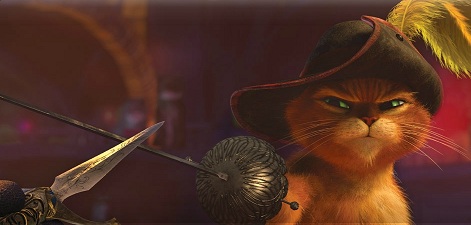
AV: Your score features a great deal of soloists, be it the guitars, the accordions, the mandoline, etc. Can you tell me about that?
HJ: We were very lucky because the very talented Rodrigo and Gabriela were also involved in the project. In a movie like this, soloistic writing becomes important. It’s a very character-driven movie. You really do focus a lot on Puss, Kitty and Humpty. And unlike a movie like Van Helsing, that has this wonderful, wonderful score by Alan Silvestri, this movie would suffer if everything is big and symphonic all the time, because then you’re gonna swamp your characters and you’re gonna loose some of the personality of these very individual, very flavorfull characters.
One of the ways is, instead of all the cues in the film being grand and symphonic all the time, which would be feel too general, the use of solo instruments can really bring the melodies forward and it makes it closer and more intimate and more individual. That’s why you hear accordion and mandolin and guitar, because of course you only need one or two guitars to have a very personal sound. You know, you don’t write for twenty guitars like you write for twenty violins. And then what happens is, the individual playing becomes more noticeable, more identifyable and more in keeping with the characters in the film. So, not only is using solo instruments the right way to go in a movie like this, but on top of that, we had the added benefit of having Rodrigo and Gabriela play the guitar parts of the score which I wrote.
Normally, in a movie, you’d find a great guitar player to play all the flamenco stuff. To have Rodrigo and Gabriela is an added bonus. You’re getting all that extra virtuosity and authenticity and individuality from two world-famous artists. They play with such a unique style and they have so much panache. I was talking to Rodrigo and he himself would admit he’s not interested in being a completely authentic, historical flamenco player. He’s like a hybrid. He like sentimental, he likes rock’n roll, he likes Spanish, he likes all kinds of things. And that comes through in their playing. I can almost tell Rodrigo and Gabriela playing after two seconds of music because they don’t sound like anyone else.
AV: Puss in Boots is not just a comedy. These are really three-dimensional characters with soul and emotion. How did you approach that aspect of the movie?
HJ: Puss has his own theme which represents his bravado and his vanity – everything you’d expect from Puss in Boots! But then, within the film, the story between Puss and Humpty, what they’re going through and how they’ve known each other since they were orphans and the fact that they were best friends, and then Humptey kind of turns to the dark side but then they make up again, etc, it’s kind of a brotherhood story. So, in addition to the first theme, there’s a brotherhood theme which really links Puss and Humpty.
As the story progresses, the betrayal elements of the story kick in and the regrets and the remorse and the getting back together -all of that comes through in the evolution of the brotherhood theme which carries all the way through the film. When they try to find the beans together and they’re staring down from the clouds, very content that they finally succeeded in this mission that they had their whole life to collect the magic beans and try and get the golden eggs, that’s when you hear the brotherhood theme.
And in emotional moments like in the end and Humpty’s hanging off the edge of the cliff and Puss is trying to save him and Humpty is berating himself of being a bad egg, it’s the brotherhood theme, too. The brotherhood theme really carries the emotional way whereas the Puss theme carries sort of the heroism and the sense of adventure.
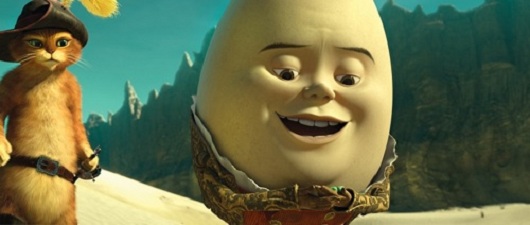
AV: What will be your next project?
HJ: Right now, I’m just starting to work on a very interesting project called Abraham Lincoln: Vampire Hunter which amazingly combines the historical gravity of one of America’s most distinguished presidents with vampires, to quite surprisingly amazing effect, to be honest. It’s a famous book written by Seth Grahame-Smith and directed by an extremely talented director. I’m very excited about it. It the early days at the moment. I’m writing my themes and just getting ideas together for that. And, of course Man on a Ledge comes out early January, which is a completely different kind of film, much more electronic.
AV: Considering the diversity of your work this year, encompassing Winnie The Pooh, Puss, X-Men: First Class, Man on a Ledge, etc, you appear extremely prolific.
HJ: I’m glad you say that. It’s sort of a moral-boosting feeling. Because it’s incredibly hard work and when you come and write music every day, seven days a week, you sometimes wonder if there’s a whole other life out there! When someone says “you’re being prolific” it makes me think “well, it’s probably worthwhile!” You know, I love music so much and I just feel so lucky to get all those amazing projects that are all so different. Because I’ve been lucky enough to have such a diverse musical background. One film I can deal with all these crazy details of electronic production with a director who really appreciate that kind of things, and on Puss in Boots, I’m really pursuing all the colors of the symphony orchestra and of Spanish folk music with a director who really appreciates that. Long may I continue…!
Our deepest thanks to Henry Jackman and Jeff Sanderson!



